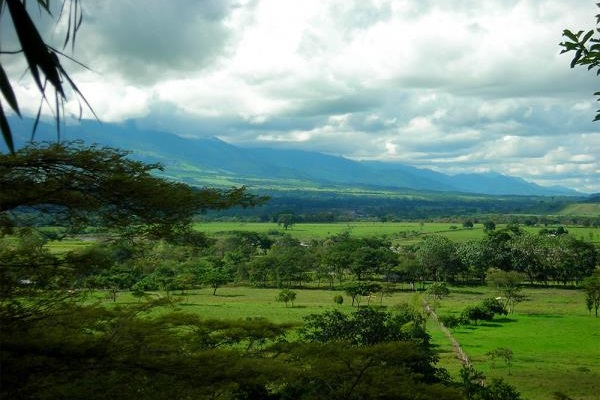
30 August 2016, Bogota/Santiago/Rome - The government of Colombia and the Revolutionary Armed Forces of Colombia, FARC, have asked FAO to collaborate in the implementation of the first point of the peace agreement they recently signed, which centres on fighting hunger and promoting rural reforms and development.
The peace agreement is the result of a four-year negotiation ending five decades of armed conflict. Its first point – Towards a New Colombian Countryside: Comprehensive Rural Reform – seeks to transform rural areas of Colombia hard hit by the armed conflict.
This first point includes a multifaceted plan for rural development that attacks the roots of rural poverty and hunger, through the creation of a land fund to be distributed among untenured peasants and large-scale initiatives to provide public goods and services in the form of infrastructure, social development, education, health and housing.
It also promotes development programs with a territorial approach and measures to stimulate agricultural productivity throughout the country, created by local communities – especially in the regions with the highest rates of poverty and those most affected by the conflict.
The first point of the peace agreement also establishes a special food and nutrition system to eradicate hunger and malnutrition.
"This multifaceted approach at the highest level, with political support from all sectors of the country is exactly what is required to eradicate hunger and poverty and to lend sustainability to the peace process," said FAO Director-General José Graziano da Silva.
Since much of the conflict in Colombia had its roots in the countryside, FAO views the parties' decision to begin the peace agreement with measures that strengthen rural areas as essential to ensuring long-lasting peace.
Graziano da Silva welcomed their move to put rural areas, agriculture, the environment, collective action and food security as cornerstones of the accords.
"Where war first sprung up, Colombia will sow the seeds of peace," he said.
FAO, the European Union and Vía Campesina to provide support
Under the final agreement to end the conflict and build a stable and lasting peace, signed between the Government of Colombia and the FARC, the parties requested FAO, the European Union and the Via Campesina organization to assist with and support the implementation of first point of the peace agreement.
A joint work plan will be developed in the coming months. FAO proposes it include actions to promote rapid food production as a way to respond urgently to those suffering from hunger and poverty, and actions to strengthening of institutions dedicated to rural development and food security, supporting decent employment and improving the quality of life in the countryside.
Millions of Colombians were displaced by the armed conflict and many peasants and small-scale producers lost their lands, which is why it is key to provide support to family farmers so they can have access to markets, investments and infrastructure, as well as market information systems, and mechanisms to integrate them to agricultural markets.
The bilateral cessation of violence, implemented by the parties since 29 August, will allow rural populations affected directly by the conflict to experience a substantial improvement in their food security.
"A safe environment is key for agricultural activities to resume. It will improve the functioning of markets and allow people to have better access to social assistance," said Graziano da Silva.
In the coming years, Colombia can optimize its agriculture and take advantage of the 22 million hectares of land with agricultural potential, of which currently only 7 million are being utilized.
"Ending hunger and malnutrition and achieving peace and rural development are not separate tasks but different aspects of the same challenge," said FAO's Director-General, noting that the successful implementation of the first point of the peace agreement will ensure the recovery of the Colombian countryside, creating conditions for a stable and lasting peace.
"There are many challenges, but there is great political will. Now it is essential to quickly generate public policies to create social protection, inclusion and cohesion, " said Graziano da Silva.